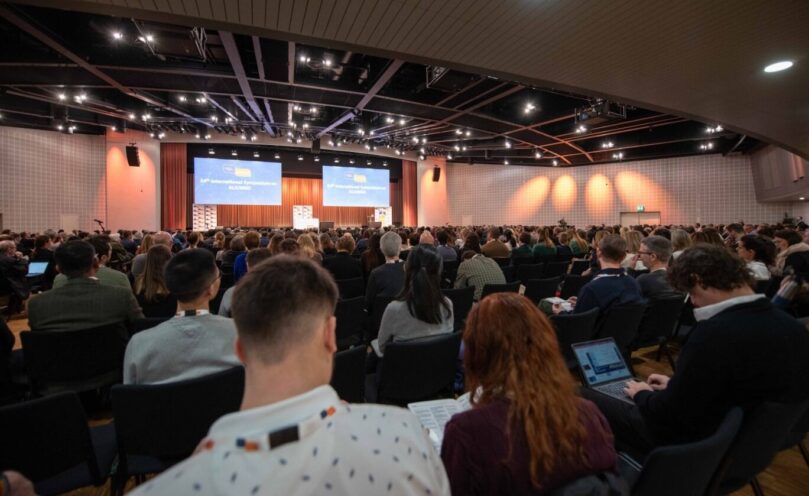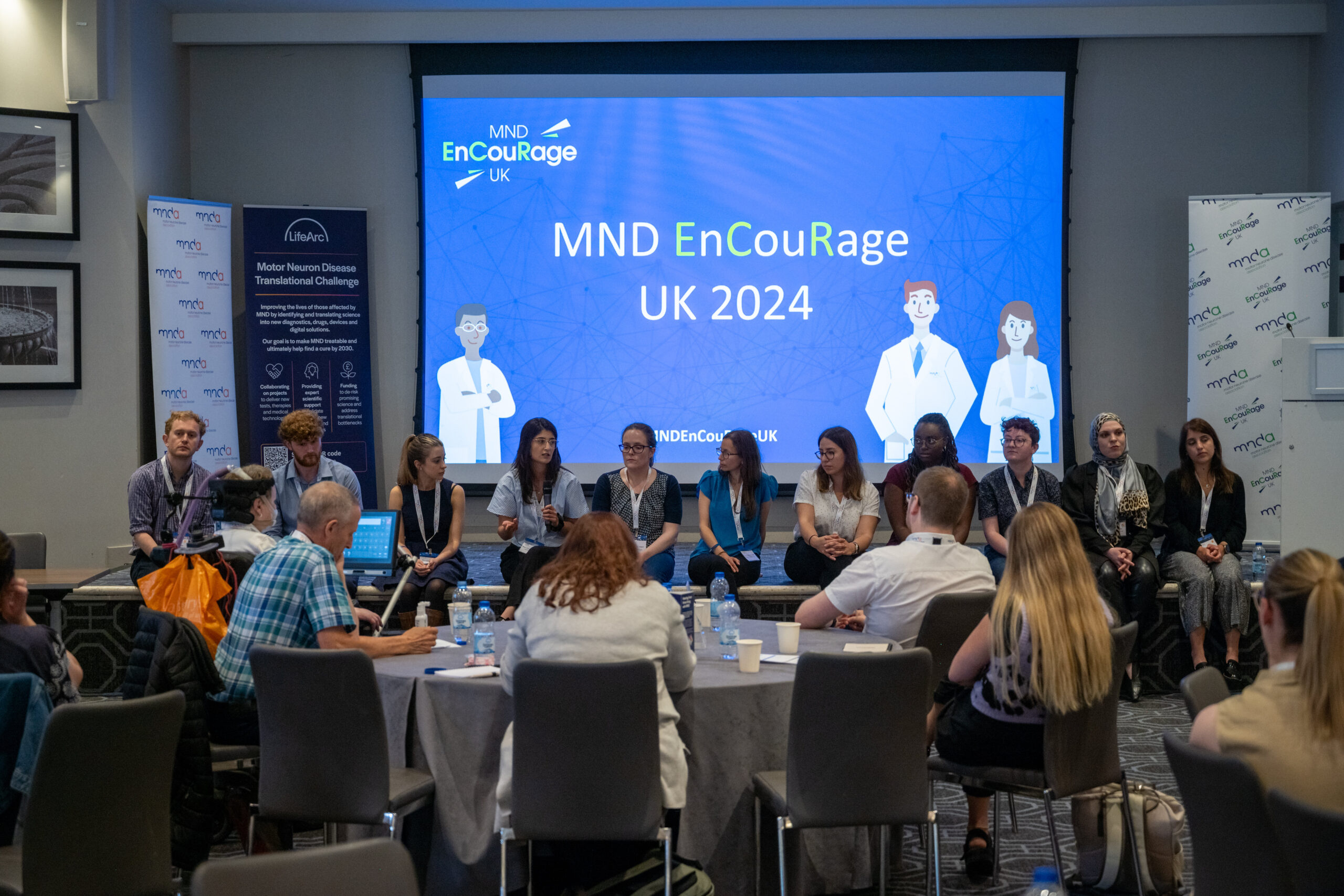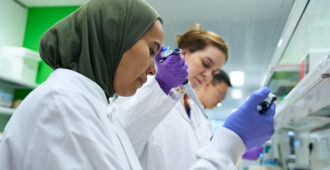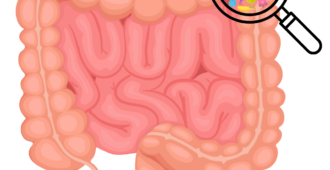After 3 years of online events, the MND research and healthcare community reunited in-person at the 34th International Symposium on ALS/MND in Basel, Switzerland! From 6 – 8 December 2023, we welcomed back over 1300 delegates, including researchers, health and social care professionals and people living with and affected by MND, becoming one of our highest attended events to date. To have people affected by MND attend the event was a special moment for many, where we welcomed patient fellows to connect with the wider international research community in the fight against MND. To continue to make the Symposium accessible, we were thrilled to be joined virtually by over 350 delegates from across the globe.
The International Symposium highlighted the sheer amount of pioneering research happening around the world. With delegates joining us from 44 different countries to hear about the huge range of research, from clinical trials and diagnostic markers through to clinical practice and improvements in care. With 3 sessions running in parallel each day and over 120 presentations, this was a key global event to raise awareness, spark ideas and form global collaborations to help drive us towards a greater understanding of the biology of MND and new potential treatments.
“It was overall a fantastic symposium and created some great food for thought which will be taken back with me to practice”
Clinician
The event opened with the Steven Hawking Memorial Lecture led by Dr Rui Costa from the Allen Institute. He discussed how his team are combining what we know about the movement pathways and brain structures into a single map to show how all the systems are connected and change over our lifetime. Knowing how a system functions and how the parts are connected will allow a greater understanding of where to target when these systems go wrong in MND.
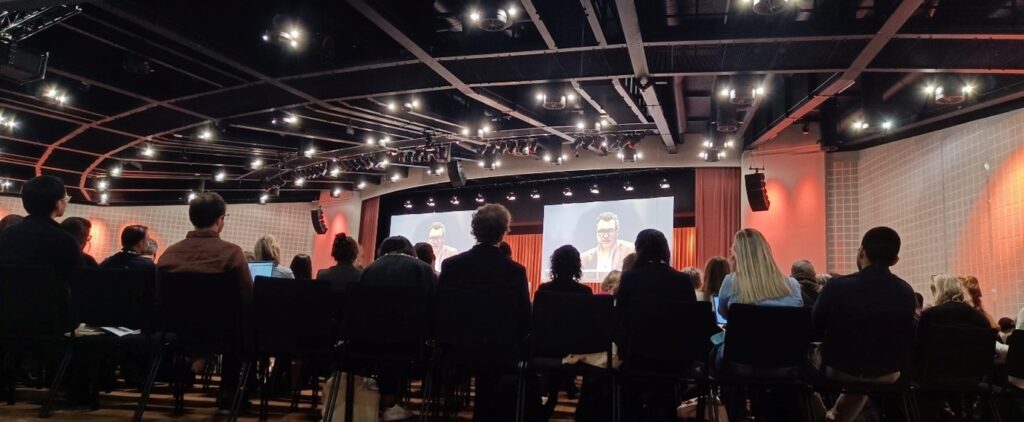
Over the three days we heard from a variety of speakers including 22 plenary speakers. We were joined by Dr Caroline Ingre from the Karolinska Institute in Sweden. She spoke about how care given to people affected by MND differs between different countries. The treatment options, such as access to clinical trials and educational resources, may vary drastically based on where people live. Dr Ingre was discussing how best to combat these challenges and make care and clinical trials more accessible for all.
The second day had many interesting talks ranging from toxic proteins in MND, neuroimaging and industry sessions to clinical practice and nutritional management. One of particular interest was on the immune response within MND. Professor Laura Ferraiuolo, who presented results from the University of Sheffield, discussed how miscommunication between immune cells known as ‘astrocytes’, and motor neurons could lead to damage seen in MND. Astrocytes surround neurons and clear away any toxins that build up, keeping the cells healthy. In MND, these astrocytes can become faulty and are unable to protect the motor neurons to their usual level. Restoring the activity and protective function of these cells could be a useful target for the development of future therapies for MND.
“Packed with engaging sessions, fruitful meetings and a buzzing atmosphere of new collaborations. Grateful for the insights and connections made!”
Ahmad Al-Khleifat (Lady Edith Wolfson Non-Clinical Fellow)
The clinical trials session was extremely popular with people lining the room. We heard from Professor Merit Cudkowicz who discussed additional findings from the trial of Tofersen. Tofersen is a treatment for people with an SOD1 mutation, accounting for around 2% of all MND. The presentation showed the long-term results of the extension of the VALOR trial which was consistent with the short-term results. The level of a marker of nerve damage, called neurofilament, remained low when Tofersen was given for a long period of time suggesting Tofersen continues to be effective long-term. This treatment, although effective to only a small proportion of people with MND, has given hope and a sense of optimism to the whole community.

In the closing session we felt further optimism as encouraging results from another potential treatment for a rare genetic and aggressive form of MND, known as FUS-MND, were presented. The content of all the talks presented demonstrated the increased pace of discovery and highlighted the huge volume of important research findings that are moving us closer to effective treatments.
It was fantastic to be back in-person at this year’s Symposium! For some delegates this was their first time attending, and for others it was a great opportunity to reconnect with old friends from the community. The event provided an opportunity for people living with MND, healthcare professionals and researchers to connect, share new ideas and learn from each other.
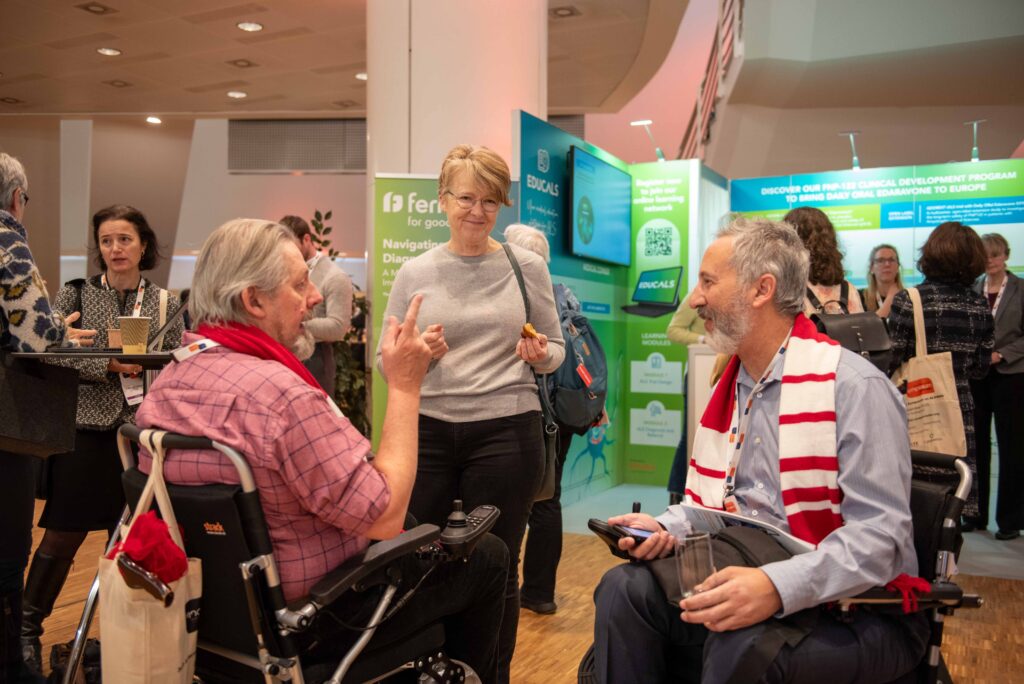
“Exhausting but very fruitful. Many old connections renewed, and new ones made, along with so much hopeful science, developments, and successes.”
Patient Fellow
This International Symposium was a huge success and brought together the global community of everyone dedicated to working towards a world free from ALS/MND. It was interesting to find out about the ongoing research, from those focused on the discovery of disease mechanisms, to the clinical trials testing for safe and effective treatments of new and repurposed drugs. Additionally, it was great to see the amount of progression in care and support provided to people with and affected by MND. As a whole, the event was eye-opening to see the tireless efforts being made by the community.
We were hugely excited to be back in person for this year’s event, the energy we saw in the events hall was electric. We look forward to seeing the relationships and collaborations made at the event progress and the differences these may make to the field. Thank you to everyone who attended in-person and online to help make this event a success. Planning for the 35th International Symposium has already begun, and we look forward to hosting this event again next year in Montreal!
We’ll be posting more blogs on the research presented at the Symposium in the coming weeks so please keep an eye out for these and you can find out more about the symposium here.

